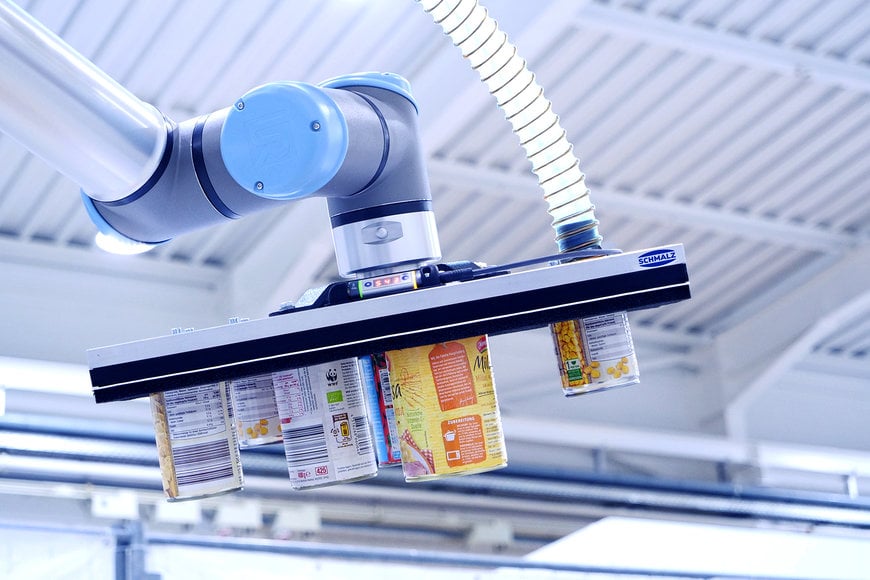www.industry-asia-pacific.com
09
'22
Written on Modified on
New lightweight layer gripper ZLW: slim for the cobot
With the new weight-reduced layer gripper from Schmalz, cobots can also palletize lighter workpiece layers. It is not only slim, but also efficient: Schmalz optimally matches the suction grid, gripper dimensions and all other components to the handling task, thus minimizing the power required for vacuum generation.

The new ZLW layer gripper has a slim design and is particularly lightweight - thus enabling palletizing with lightweight robots.
Depending on the model and manufacturer, lightweight robots have a payload of up to 25 kilograms. In order to use them for layer-by-layer palletizing and depalletizing, J. Schmalz GmbH has given its layer grippers a diet. The result is the particularly lightweight layer gripper ZLW, which lifts up to 20 kilograms while weighing only between four and 7.5 kilograms, depending on its size. This leaves the robot with enough payload for the actual handling task.
The ZLW extends the SPZ series of layer gripping systems downwards and can grip several open, hollow or closed objects such as jars, cans or cardboard boxes with different dimensions simultaneously. It compensates for height differences in the workpiece layer with an optionally available spring-loaded flange. In addition, Schmalz configures the lightweight gripper individually: The user receives an efficient complete system with components that are matched to each other and to the task. The vacuum generator is also dimensioned so that it does not require more power than is necessary for process reliability. But this is not the only thing that increases the efficiency of the handling process: the new layer gripper also indirectly helps to keep the CO2 footprint low: Smaller robots require less power and thus support sustainable automation - for example in production feeding, automated warehousing or end-of-line palletizing.
Schmalz has deliberately kept the design slim: The sealing element is optionally equipped with individual plug-in suction cups or a sealing foam. A frame connects these to the honeycomb plate, on which a pressure relief valve, the vacuum switch VSi and the flange are mounted. The vacuum generator stands separately.
www.schmalz.com
Depending on the model and manufacturer, lightweight robots have a payload of up to 25 kilograms. In order to use them for layer-by-layer palletizing and depalletizing, J. Schmalz GmbH has given its layer grippers a diet. The result is the particularly lightweight layer gripper ZLW, which lifts up to 20 kilograms while weighing only between four and 7.5 kilograms, depending on its size. This leaves the robot with enough payload for the actual handling task.
The ZLW extends the SPZ series of layer gripping systems downwards and can grip several open, hollow or closed objects such as jars, cans or cardboard boxes with different dimensions simultaneously. It compensates for height differences in the workpiece layer with an optionally available spring-loaded flange. In addition, Schmalz configures the lightweight gripper individually: The user receives an efficient complete system with components that are matched to each other and to the task. The vacuum generator is also dimensioned so that it does not require more power than is necessary for process reliability. But this is not the only thing that increases the efficiency of the handling process: the new layer gripper also indirectly helps to keep the CO2 footprint low: Smaller robots require less power and thus support sustainable automation - for example in production feeding, automated warehousing or end-of-line palletizing.
Schmalz has deliberately kept the design slim: The sealing element is optionally equipped with individual plug-in suction cups or a sealing foam. A frame connects these to the honeycomb plate, on which a pressure relief valve, the vacuum switch VSi and the flange are mounted. The vacuum generator stands separately.
www.schmalz.com

